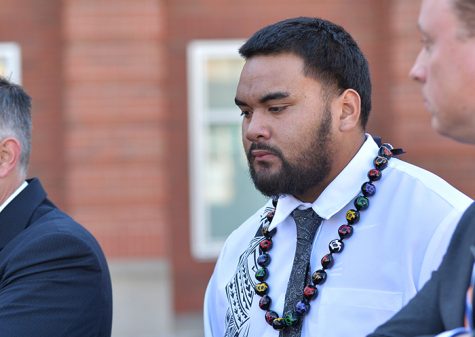WSU officials plan trip to Samoa
President, VP of student affairs and police chief to travel overseas for lesson in student diversity
July 19, 2017
President Kirk Schulz will travel to Samoa next month with other representatives from the university and city of Pullman in an attempt to gain a better understanding of the needs of Pacific Islander students.
Schulz will be joined by former WSU football player Jack Thompson, who is Samoan, Pullman Police Chief Gary Jenkins and Mary Jo Gonzales, vice president of Student Affairs. Gonzales said the trip is the first in a series to connect with student populations to which WSU hasn’t historically given enough attention.
“Really, it’s helping us to understand the lay of the land,” she said, “and where students feel the need to be supported.”
The trip follows a contentious year for WSU’s relationship with the Pacific Islander community. The Student Conduct Board faced accusations last fall of racial bias against Pacific Islander students for its handling of the cases of four Samoan football players.

After accusations last fall of racial bias at WSU against Pacific Islander students, like Robert Barber, university and city officials will travel to Samoa to better understand Pacific Islander culture.
An independent law firm reviewed the conduct system and found no evidence of racial discrimination, but did find evidence of structural and implicit bias. Gonzales said the trip is not directly related to these incidents. Instead, she said, the idea came up in her interview with Schulz as they discussed strategies for making the university more inclusive.
“I think that was just a microcosm of part of why we’re going,” she said. “This really is about WSU and the ‘Drive to 25.’ ”
One of the metrics of the “Drive to 25,” a campaign to place WSU in the nation’s top-25 research institutions by 2030, is diversity among students, faculty and staff.
Gonzales said some students, such as Samoans, may come from a place with different concepts of justice and academic integrity. Therefore, she said, WSU has a responsibility to help them understand the systems in place here, especially while they are going through a process like student conduct.
“I think that going to Samoa is helping us to understand what might be some of those barriers to success,” Gonzales said.
According to WSU’s enrollment report, there were 100 students of Native Hawaiian or Pacific Islander descent in spring 2016, making them .4 percent of the student population.
The delegation leave on Aug. 23 for five days and stay in Pago Pago, the capital of American Samoa. They will meet with the governor and lieutenant governor, the director of education and the police chief, as well as WSU alumni.
Jenkins said the university approached him about joining them on the trip. WSU football head coach Mike Leach accused the Pullman Police Department of unfairly targeting football players. Jenkins said this likely worried the Samoan community about the relationship between the city and Samoan students.
“My hope is to … ease those concerns,” he said, “and to let them know that we are fair and professional here, and that we don’t target anyone for any reason other than their actions in the community.”
He said the events of last fall led the university and the city officials to work toward better town-gown relationships in the months since.
“I think there’s been a real acknowledgement of how we impact each other,” he said. “Just acknowledging that helps us to know that we need to collaborate with each other.”
WSU is also working to fix bias problems through revisions to the Student Conduct Code, and will seek community input in the fall. They hope to instate the new rules by January.
“Recognizing that we had those [issues],” she said, “it meant we needed to pay attention to what structural and implicit bias systems exist here at WSU that prevent students from fully experiencing our Cougar community.”









